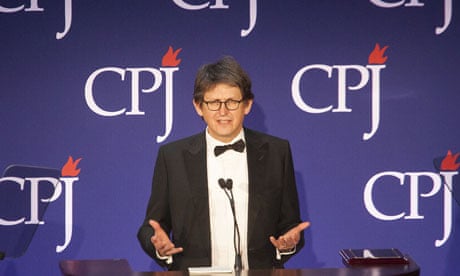Alan Rusbridger, Guardian editor-in-chief, has warned that "targeting journalism has become a trend" and stressed the importance of freedom of the press after receiving a lifetime achievement award.
Rusbridger was addressing the Committee to Protect Journalists in New York on Tuesday, after being honoured at the CPJ's annual ceremony.
Four journalists had earlier been rewarded by the CPJ after risking their lives to uncover abuses of power and human rights violations in Brazil, China, Kyrgyzstan and Liberia.
Rusbridger paid tribute to those reporters – two of whom could not attend the ceremony due to imprisonment. He said it was important to recognise "how much bravery is now an increasing part of what is demanded of being a journalist, and how dangerous it can be to be a journalist".
"Targeting journalism has become a trend and now the people who are harassing and killing journalists include governments as well as the people you would expect," Rusbridger added.
"And now, when journalists are not being physically intimidated, they are increasingly being put under the sort of surveillance which would make reporting and the protection of sources all but impossible."
Mauri König, Dhondup Wangchen, Azimjon Askarov and Mae Azango were announced as the 2012 winners of the CPJ's International Press Freedom Awards at the ceremony – Wangchen and Askarov are in prison for their work in China and Kyrgyzstan respectively.
The four winners of the 2012 CPJ awards were honoured at the event at the Waldorf-Astoria hotel. Askarov, from Kyrgyzstan, is serving a life sentence in his home country in connection with his coverage of official wrongdoing and abuse. He was convicted of complicity in an official's murder and anti-state crimes, although an investigation by the CPJ found no material evidence to support the charges.
Wangchen is a Tibetan documentary filmmaker whose film Leaving Fear Behind gave an insight into life in Tibet ahead of the 2008 Beijing Olympic Games. He was sentenced to six years in prison in China after the film was smuggled overseas – it has been shown in more than 30 countries – and was denied an appeal in January 2010.
König's work includes an investigation into the alleged kidnapping of children in his native Brazil and their sale into the Paraguayan military. While researching the story he was badly beaten in Paraguay.
Azango, from Liberia, has worked to cover the plight of women and young girls in her country, including the subject of female genital mutilation. She was repeatedly threatened during the course of her work.
Rusbridger drew attention to the issue of press freedom in the UK, expressing concern about the communications data bill, which will require internet and phone companies to track the records of every citizen's web and mobile phone use, including social networking sites, without retaining their content, and store them for 12 months.
But Rusbridger also said that there were cases of media organisations deviating from the real purpose of journalism. He said much of the information to come out of the Leveson inquiry was "to the shame of journalists".
"Media organisations could forget the good that journalism could do," he said, as they resorted to bribery, surveillance and public intrusion.
"Some of the activities look less like journalism and more like the sort of things that east European intelligence agencies got up to in the bad old days."
Rusbridger spoke about the harassment of journalists in Britain and abroad. He said he had had to fly to Libya to help release foreign correspondent Ghaith Abdul Ahad from imprisonment, and described how reporters Luke Harding and Amelia Hill had faced harassment in Russia and Britain respectively.
But when countries attempt to put pressure on journalists' organisations like the Guardian– which also publishes MediaGuardian – those journalists can benefit from having readers, and supporters, in countries around the world, Rusbridger said.
"Increasingly, they take on the constitutional and legal protections of countries which mercifully still do have strong roles and enshrined free speech," he said.
Rusbridger gave the example of when he called Bill Keller, then editor of the New York Times, after the Guardian obtained WikiLeaks documents.
"Essentially the deal was this. I've got the memory stick, you've got the first amendment," Rusbridger said.
"It was not clear to me that British libel laws and the British laws around official secrecy would give the Guardian the defences it needed for a story like that."
Rusbridger said the way the WikiLeaks story was reported by the Guardian and the New York Times illustrated how people "living in countries like China, like Brazil, like Liberia, and like Kyrgyzstan can, in a networked world, use the kind of solid protections you enjoy here in America to publish a truth that would be forbidden in their home countries".
The CPJ, said Rusbridger, editor of the Guardian since 1995, had "persevered in staunch defence of the right of the press to investigate and publish stories in the public interest".
"Alan Rusbridger has created a newspaper and website that inform the entire world," said CPJ chair Sandra Mims Rowe. "We are proud to pay tribute to this achievement."
To contact the MediaGuardian news desk email editor@mediatheguardian.com or phone 020 3353 3857. For all other inquiries please call the main Guardian switchboard on 020 3353 2000. If you are writing a comment for publication, please mark clearly "for publication".
